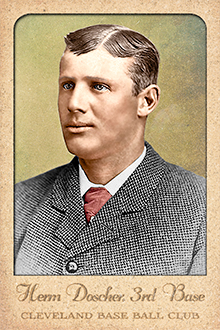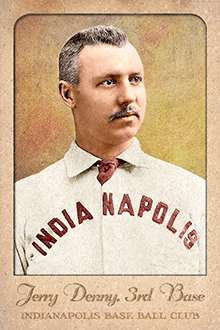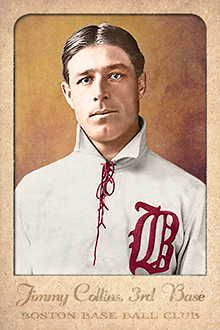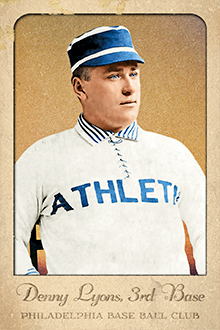
- Series: Pioneer Portraits II: 1875-1899
- City: Philadelphia
- Team: Athletics (AA)
- League: American Association
Dennis Patrick Aloysius Lyons (1866-1929) was a strong hitting third-baseman over a thirteen year career in the major leagues from 1885 with Providence to 1897 with the Pirates. His lifetime batting average was .310. In 1890 he led the American Association in on-base percentage and slugging, and was second to Chicken Wolf in BA. He hit 62 home runs in the Deadball Era and was known as a formidable fielder in the no-glove era. Lyons’ era was also a time of rapid evolution in the game. In 1887, the year Denny “hit” safely in 52 straight, the pitcher’s box had been tightened and the pitcher’s delivery shortened to one step. Walks were also considered hits that year which has caused most modern students of the game to dismiss his “streak,” second only to Joltin’ Joe. But DiMaggio didn’t have to hit a fastball hurled from fifty feet. Only two of the 52 games was affected by walks but they were in the middle of the run. Despite such quibbles, Lyons was clearly a very accomplished player both offensively and afield.
- Consistently ranked among batting leaders in both leagues he starred in: AA and NL
- An Amos Rusie fastball broke two fingers and ended Denny’s ML tenure. He continued in the minors and hit .274 for the Beaumont Oil Gushers in 1903
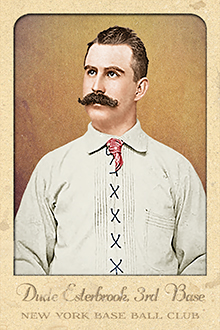
- Series: Pioneer Portraits II: 1875-1899
- City: New York
- Team: Giants
- League: National League
Thomas John Esterbrook (1857-1901) played third and first base for seven different teams over 11 professional seasons. In 1884, Esterbrook had a terrific year, compiling a .314 batting average, with 150 hits, 29 doubles, 11 triples, 110 runs and an OPS+ of 150 for Jim Mutrie’s New York Metropolitans of the American Association. By 1889, Dude was player/manager of the Louisville Colonels during one of the most dismal seasons in MLB history (27-111, the worst record in the AA’s existence). As the losses mounted, tempers rose and Esterbrook’s attempts to fine players met with rebellion. He lost his post to “Chicken” Wolf who replaced him only to face the first true players’ strike when owner Mordecai Davidson reinstated Dude’s levies. Ironically, Esterbrook set his career mark, hitting .318 that woeful campaign, albeit in a part time role. His lifetime average in the majors was .261.
- Esterbrook’s confrontational style, evident in his short tenure as a manager, signalled emotional trouble ahead. His life ended at the age of 43 when he jumped from a train that was transporting him to a psychiatric hospital
- The Dude abides
- Series: Pioneer Portraits II: 1875-1899
- City: Cleveland
- Team: Blues (NL)
- League: National League
John Henry “Herm” Doscher, Sr. (1852-1934) was a no-nonsense player from 1872-82 and then umpired for three full seasons. He was not above using force to control unruly players. Herm was embroiled in a dispute with management over a contract that led to his temporary ouster from baseball before being exonerated in court and reinstated. He once recalled his days officiating games: “I’ve got to play ring master, school teacher, poppa, momma, and doctor in every game.”
- Doscher’s son Jack became the first second-generation major leaguer in 1903
- As a scout, Herm was credited with discovering Wee Willie Keeler
- Series: Pioneer Portraits II: 1875-1899
- City: Indianapolis
- Team: Hoosiers (NL)
- League: National League
Jeremiah Dennis Denny (1859-1927) was a rare ambidextrous third baseman who played professionally for over 20 years, 14 in the majors. He was the last position player to play his entire career without a glove. Denny led the ’84 Providence Grays to the first inter-league post-season tournament championship as the NL beat the AA in 1884.
- Holds the MLB record for chances by a third baseman in a game: 16 on 8/17/82
- Denny’s remarkable ability to throw with either hand led him to forego the glove
- Series: Pioneer Portraits II: 1875-1899
- City: Boston
- Team: Beaneaters
- League: National League
- Hall: National Baseball Hall of Fame
James Joseph Collins (1870-1943) was the best in the NL at 3B when he jumped to the new AL in 1901. Collins led the Boston Americans to the 1st World Series championship in ’03, downing Pittsburgh in best-of-nine. Thanks to John McGraw’s stubborn refusal to play the next year’s AL winner, Boston was denied another opportunity despite its 1st place finish.
- The dust-up between leagues resulted in rules beginning in 1905 making the Series the permanent premier event in Major League Baseball
- Upon his induction into the HOF Collins became the first regular third-baseman so honored
- Elected to Hall of Fame: 1945


